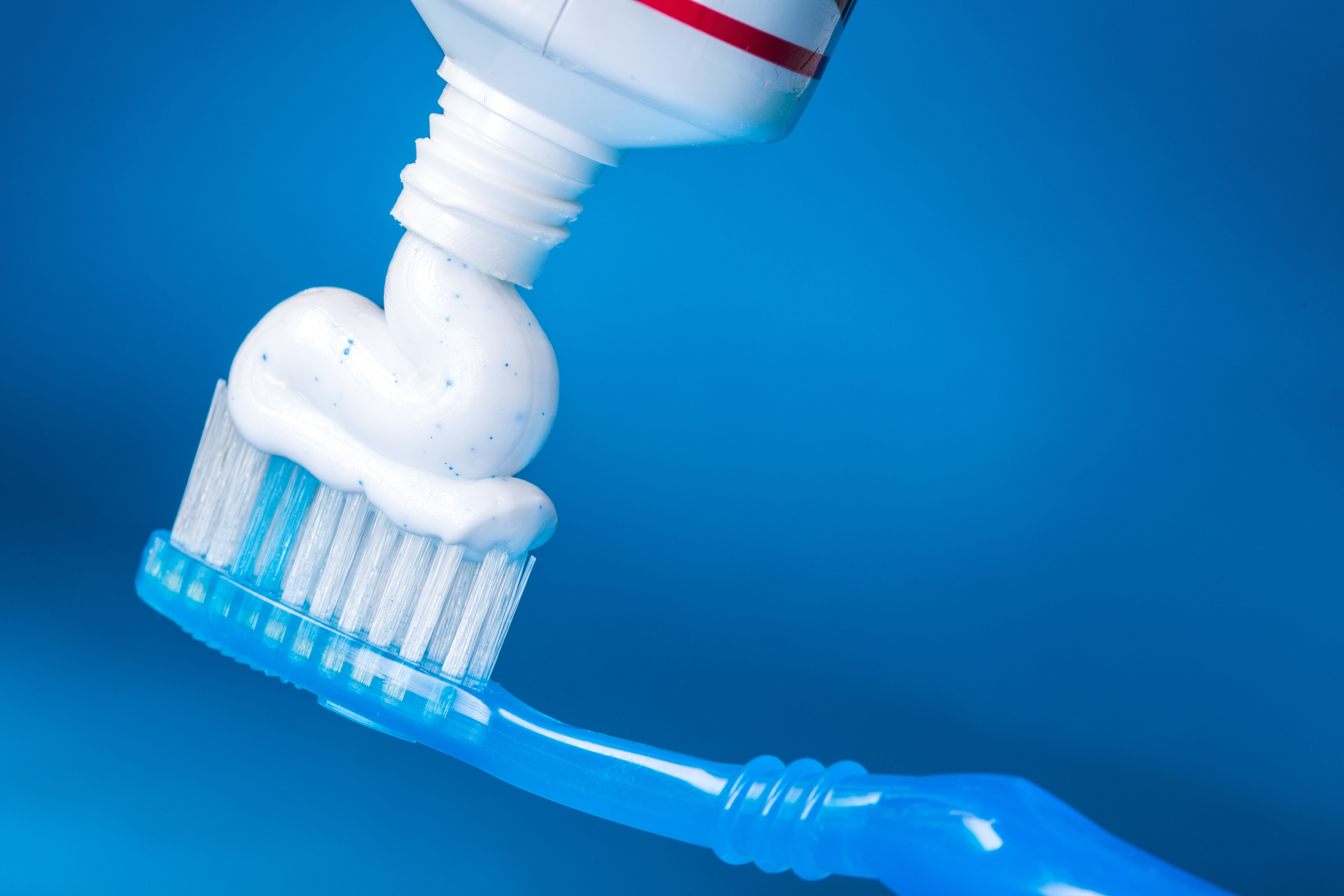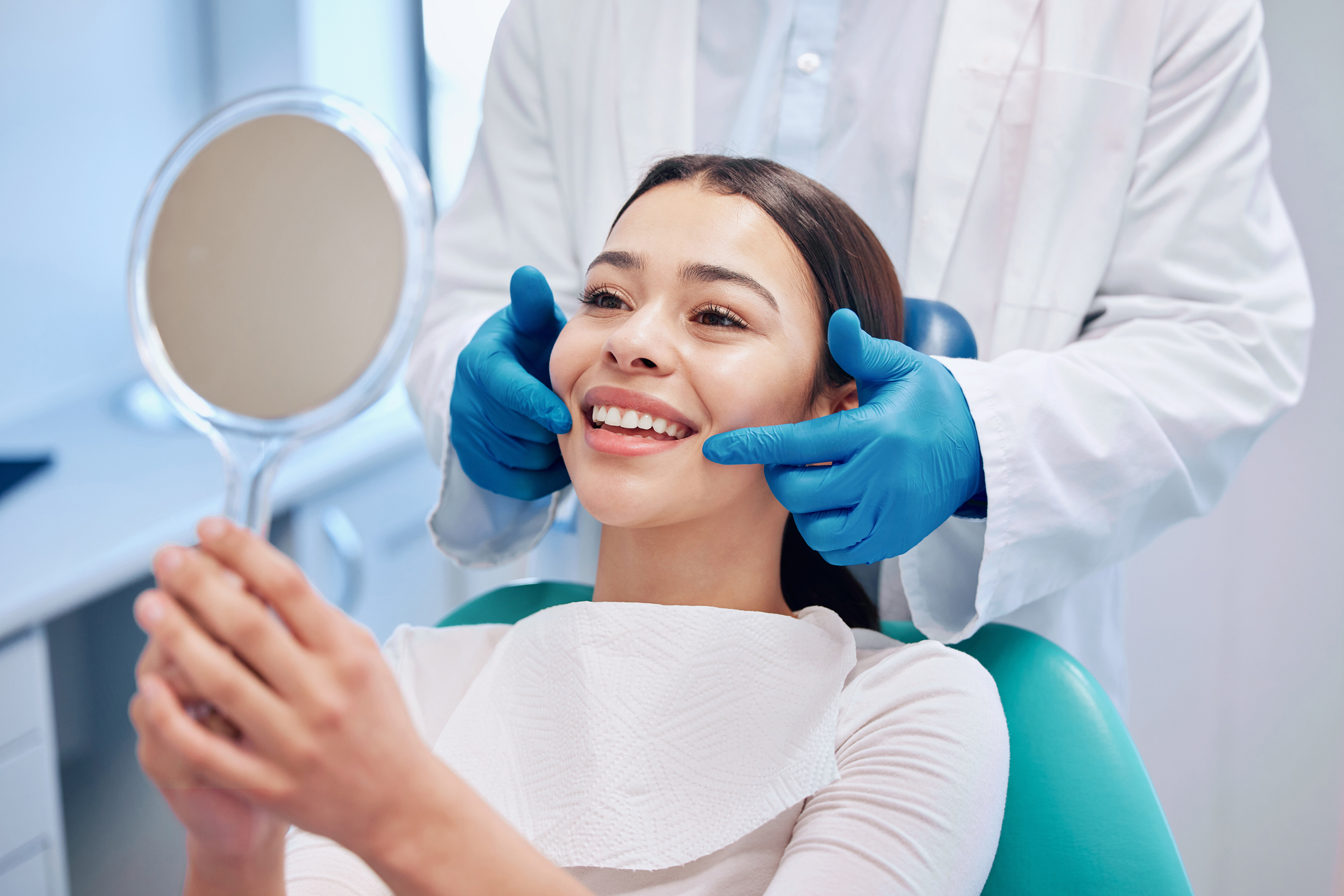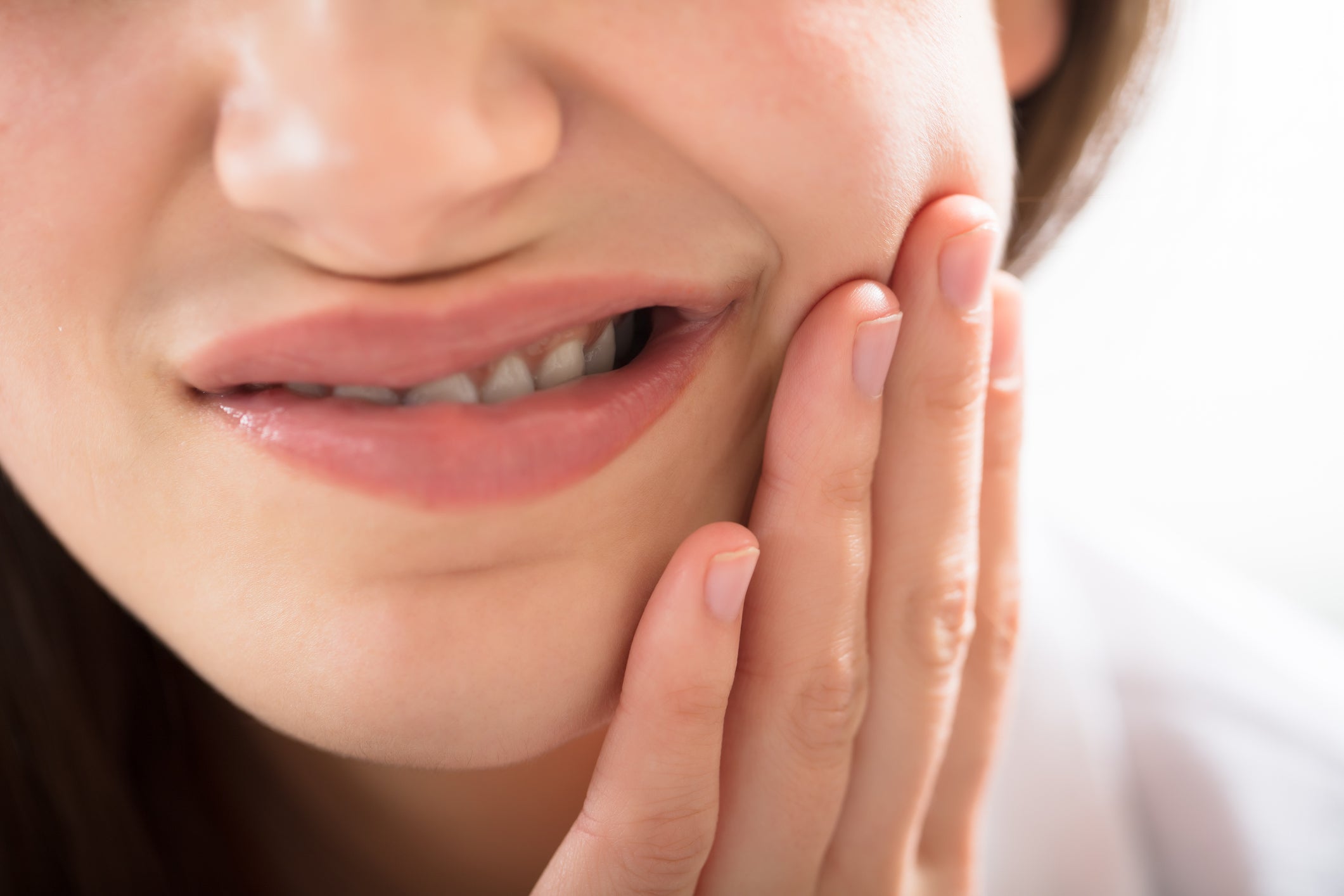-
The Benefits of Good Oral Hygiene Habits

Young woman with good dental hygiene habits.
We know a lot about the fact that it’s important to keep a clean mouth. We also know that the way to a clean mouth is by brushing, flossing, and regular dental visits. What are the reasons we want to keep a clean mouth? Here are some facts about oral hygiene, including some tips you may not have known about keeping those pearly whites nice and healthy!
- Keeping Your Teeth
This one may seem obvious, but some people don’t realize how easy it is for teeth to fall out of an unhealthy smile. It’s not only tooth decay, but there are other ways you can easily lose teeth. Gum disease is another way that teeth can fall out. We need our teeth to enjoy those delicious, healthy foods. Not only that, those who keep all of their teeth for life are likely to live longer than those without all of their 20 teeth. So do your best to keep a clean mouth and healthy teeth. - Lowers Risk of Sickness and Disease-This is a big one. Did you know that keeping your teeth clean can greatly reduce your risk of serious illness? It’s a fact. Here are some facts about disease that you maybe didn’t know.
- Covid-Recent studies have shown that keeping your mouth clean can reduce your risk of suffering a fatal outcome from covid. Keep your mouth clean and reduce your risks.
- Heart Disease-Gum disease and periodontal disease have been linked to heart disease according to the CDC. It is theorized that bacteria from the gums enter the bloodstream and affect the cardiovascular system.
- Cancer-As if that weren’t enough, gum disease has been linked to certain cancers as well. In fact, those with gum disease are 14% more likely to experience some form of cancer in their lifetime. Those with gum disease are more likely to develop gall bladder cancer, breast cancer, esophageal cancer, and skin cancer.
- Dementia-Another big one, this one is hard to hear. But there is a 70% greater chance of developing dementia for someone who has unhealthy gums than for someone who has healthy gums. Gum disease is a very serious affliction.
- Having a Healthy Baby
Moms who have healthy mouths are much less likely to have premature babies or babies with low birth weight. If you are pregnant, keep those teeth nice and clean and you will increase your beautiful baby’s chance at a healthy birth. - Staying Gorgeous
Keeping all your teeth means you’re just one step closer to lifelong beauty. Regular brushing, flossing, and dental exams will help you keep the wonderful smile you were born with and that is very important. Whether it’s a first date, a job interview, or your first day at college, having a healthy and attractive smile means you’re able to put your best foot forward in every situation.
Park 56 Dental
When you are looking for the best advice about how to keep a healthy mouth and a healthy body the best place in New York is Park 56 Dental. Voted the number one dentist in the New York area, we have everything you need for perfecting that beautiful smile. For more information about or to ask any questions about your teeth, visit our website or give us a call at (646) 679-3973. - Keeping Your Teeth
-
Why Regular Dental Check-Ups are Essential for a Healthy Smile

Patient getting dental check-up.
Maintaining a beautiful and healthy smile begins with your daily dental routines of brushing and flossing. Yet even the most thorough approach to oral hygiene also requires frequent dental check-ups. Here’s why:
- Early Detection of Dental Issues
Even if nothing seems out of the ordinary, dental problems can sometimes develop without any noticeable symptoms in their early stages. Regular checkups can give your dentist the chance to identify cavities, gum disease and oral cancer at early stages, which can make them more manageable.
- Professional Cleaning
Brushing and flossing alone can’t remove all plaque and tartar buildup. Your dentists at Park 56 can perform thorough cleanings to remove these deposits, helping to reduce the risk of cavities and gum disease.
- Oral Hygiene Education
You may need personalized advice on improving your oral hygiene regimen. Your dentist and hygienist can assess the work you do at home and provide you with tips on how to improve your brushing and flossing techniques. They might also recommend new products or technologies that could be beneficial for your specific needs.
- X-rays and Diagnostic Tools
Special diagnostic equipment can help shine a light on things that you might not be able to detect at home. Hidden cavities, impacted teeth, or bone loss might be lurking out of sight, but regular annual X-rays can give you an inside look to be able to diagnose and repair an issue before it becomes a serious problem.
- Gum Health Assessment
Gum health is an indicator of overall dental health. Early screening and detection of gum disease can provide you with treatment necessary to prevent tooth loss and other problems. Your dentists at Park 56 can assess your gums and help treat or prevent gum disease before it starts.
- Preventing Complications
Regular dental analysis can keep your medical records up to date on your past issue, ensuring that your treatment plan is current and effective. This can give your dental team the opportunity to monitor your progress and maintain a treatment plan that can lead to total wellness and save you time and money on more extensive remedies.
- Oral Cancer Prevention
Your dentist is trained to detect the early signs of oral cancers during routine exams. Anyone can become susceptible to mouth cancers but patients who smoke tobacco or drink alcohol are especially at risk. Early detection can make treatment easier and less invasive, significantly improving chances of successful treatment.
- The Personal Touch
Your dental team at Park 56 take a personal approach to every patient. We take the time to get to know you, your dental history, your lifestyle and your unique needs. Whether you need a simple cleaning, a filling, oral surgery, prosthodontics, sedation dentistry, endodontics, or Invisalign, our dental specialists can customize an immediate and ongoing treatment plan to fit your needs.
Regular dental screenings are essential to your overall oral hygiene plan, and the experts at Park 56 can help you make sure you are staying on track and maintaining your dental health. Give us a call and schedule your next appointment today so you can keep your smile shining bright.
-
Preventing Dental Emergencies: Tips and Tricks to Keep Your Teeth Safe

Man taking care of teeth to prevent dental emergencies.
Dental Emergencies Are a Problem
When you have a dental emergency, it’s more than just inconvenient, it’s also traumatic. Painful and stressful, accidents can lead to hours at the emergency dentist and, in some cases, permanent tooth loss or severe gum bleeding. While there’s no way to prevent accidents completely, there are a few steps you can take to avoid most dental emergencies.
Your Dentist is Your Ally
Regular dental visits can help keep your teeth healthy and strong, catching problems before they become emergencies. What’s more, your dentist can recommend measures like sealants to protect your teeth from decay or an oral appliance to guard against bruxism. See your dentist twice a year for preventive care and a cleaning. Being proactive about preventive dental care can be much less costly and stressful in the long run.
Tips for Keeping Your Teeth Safe
- Practice good dental hygiene. At home, brush twice a day, floss at least once, and use mouthwash. Keeping your teeth clean can help prevent cavities, gum disease, cracks, fractures, and infections. Having your teeth deep cleaned at the dentist’s office twice a year gives added protection.
- Eat a tooth-strengthening diet. Eat a nutrient-dense diet, taking care to eat foods like leafy greens, fresh fruits and vegetables, and calcium-rich foods. Limit consumption of processed foods and sugary sweets, which can cause plaque buildup and feed the bacteria that cause tooth decay.
- Protect your teeth during sports. If you participate in sports, talk to your dentist about getting a custom-made mouthguard. This can make a big difference in keeping your teeth from being knocked out or damaged. You might also want a mouthguard to wear at night, to prevent teeth grinding.
- Manage your stress. Stress is bad for your whole body, and it can damage your teeth. People who are stressed may absentmindedly chew on hard things, and stress can cause people to grind their teeth. Embrace techniques like mindfulness, practice yoga, or find other healthy ways to manage your stress.
- Remember that teeth are not tools. We’ve all used our teeth for something we shouldn’t from time to time, when we can’t find the scissors, or the bottle opener is in another room. It could be fine, but then on the other hand, it only takes once for a tooth to crack. The convenience of not having to rummage through a drawer or ask for help is not worth risking your teeth.
- Don’t hesitate to seek dental care. Don’t let a dental emergency get out of hand. If you have a toothache, seek treatment as quickly as possible. Pain is an indication that something is not right, and getting treatment quickly can mean the difference between a routine procedure and serious oral surgery.
Park 56 is Here for Your Emergencies
If you’re looking for a dentist in New York, why not choose the dentist voted best in the city? At Park 56 Dental Group, we offer pediatric, prosthodontics, endodontics, oral surgery, Invisalign®, emergency, and sedation dentistry, all at the highest level of treatment. We serve the Midtown, Central Park, Upper East Side, Park Avenue, and all surrounding Manhattan and New York areas, with a patient-centered practice that has hours to fit your schedule. Schedule your complimentary consultation today by contacting us online or calling us at (212) 826-2322.
-
Oral Hygiene Tips for Busy Professionals

Woman travelling
A Busy Schedule Can Get in the Way of Self-Care
When you’re a busy professional, keeping up with a hectic, fast-paced schedule, it’s easy to put self-care on the back burner. So many things demand your time and attention, whether you’re traveling or just living your life, that you may have trouble keeping up with things that are important to your health. One thing you should never neglect, though, no matter how busy life gets, is your oral health. Here, we offer some tips for busy professionals, to help you keep up with your oral hygiene.
Caring for Your Teeth at Home
Brush your teeth at least twice a day, for a minimum of two minutes each time. Using a soft-bristled brush with a small head and flexible neck, brush your teeth gently in a circular motion, with your brush at a 45 degree angle to the gum line. Start at the back of the mouth, working systematically and taking care to brush along the inner, outer, and chewing surfaces. Brush your tongue to remove bacteria from your mouth, and don’t forget to floss at least once a day. Wait for a few seconds after brushing to rinse so that fluoride has a chance to sit on your teeth. Limit in-between meal snacking, watch your sugar intake, and choose water over fruit juice or sweetened drinks.
Dental Care on the Go
Whether you’re traveling or just racing between appointments, prepare ahead of time to care for your teeth on a busy day. Carry a floss travel pack in your bag or wallet, and bring along some fresh, crunchy, fibrous vegetables like celery, carrots, and cucumbers. These foods have a high water content, which helps to balance the pH level of your mouth, and eating them helps scrape debris from your teeth in the middle of a hectic day when you don’t have time to brush. If you are traveling, clean the inside of your toiletries bag before packing your toothbrush, and let your toothbrush air dry whenever possible, to prevent the growth of microbes. Alternately, consider using disposable toothbrushes so that you know you always have a clean one. If you’re visiting a location where the water isn’t trustworthy, brush your teeth using bottled water.
Amping Up Your Efforts
If being pressed for time is a frequent problem for you, consider investing in an electric toothbrush. Electric toothbrushes have smaller heads, to get into tight spaces more easily, and the rotating brush effectively removes plaque from your teeth. Some can elan your teeth thoroughly in as little as 15 seconds, so that can shave a few minutes off of your daily routine. No matter which kind of toothbrush you use, replace it every two to three months, or immediately after you’ve been ill. If you find you need to replace your toothbrush more frequently than that, you may be applying too much pressure when you brush. Talk to your dentist about improving your technique so that you can keep your mouth clean without damaging your gums and tooth enamel.
Finding the Very Best Dentist
Perhaps the most important part of caring for your dental health is finding a dentist and keeping regular dental appointments to keep your mouth clean and catch any issues before they become serious- and time consuming. If you’re looking for a dentist in New York, why not choose the dentist voted best in the city? At Park 56 Dental Group, we offer pediatric, prosthodontics, endodontics, oral surgery, Invisalign®, emergency, and sedation dentistry, all at the highest level of treatment. We serve the Midtown, Central Park, Upper East Side, Park Avenue, and all surrounding Manhattan and New York areas, with a patient-centered practice that has hours to fit your schedule. Schedule your complimentary consultation today by contacting us online or calling us at (212) 826-2322.
-
How to Choose the Right Toothpaste for Your Unique Dental Needs

Picking the right toothpaste
How hard can it be to choose a toothpaste?
How do you go about choosing a toothpaste? It seems like it should be easy! Once you get to the store, though, it’s easy to be overwhelmed by all the options. With so many toothpastes from which to choose, how do you pick the right one? Here, we offer some helpful tips for choosing the right toothpaste for your unique dental needs.
Know the Basics
Toothpastes contain abrasive agents, flavoring agents, detergents, humectants, and detergents, and are available in gel, paste, powder, or tablet forms. There are two important things to look for in a toothpaste: fluoride and the ADA seal of approval. Fluoride has been proven to protect against tooth decay and help to remineralize teeth, and the ADA (American Dental Association) must verify that a product is effective before that product can display the seal of approval.
Evaluate Your Dental Needs
Think about what you want a toothpaste to accomplish for you beyond just cleaning your teeth. Some common concerns include bad breath, sensitive teeth, plaque, gum disease, tartar, and yellowing teeth. Once you have assessed what you need, look for a toothpaste that fits with your concerns.
- Preventing cavities: Fluoride is a major factor in preventing cavities and strengthening enamel. Choose a toothpaste with mild abrasives, like hydrated silica or calcium carbonate, to remove plaque and surface stains without damaging enamel.
- Tartar control: Bacteria can cause biofilm on the teeth, and this can lead to plaque. When biofilm traps salivary calcium and phosphate, it crystallizes into tartar, also called calculus. While this is removed by the dental hygienist during your cleanings, it can be helpful to use a tartar control toothpaste in between visits. These toothpastes typically contain ingredients like zinc citrate and triclosan.
- Sensitivity: Dental pain is typically due to dentin hypersensitivity. Toothpastes with potassium and fluoride can help with sensitivity, as can toothpastes with strontium chloride, calcium carbonate, or arginine. Using desensitizing toothpaste for at least eight weeks can help reduce dental pain.
- Gum disease prevention: Toothpaste with ingredients that have antibacterial properties, like triclosan or stannous fluoride, can help prevent gum disease by reducing plaque and gum inflammation.
- Controlling bad breath: Brush your teeth for two to three minutes, at least twice a day, with a fluoride toothpaste. Brush your tongue from back to front, or use a tongue scraper. Baking soda can be effective for eliminating halitosis (bad breath), either in a baking soda toothpaste or on its own.
- Whitening teeth: There are several whitening toothpastes on the market, with bleaching ingredients like silica, pyrophosphates, and hydrogen peroxide. Hydrogen peroxide is a good option because it is gentle and won’t cause irritation in your mouth. If you do experience any uncomfortable symptoms, contact your dentist.
Choosing a Toothpaste for Children
Children over age six typically use adult toothpaste. Before that, as long as the toothpaste meets the fluoride and ADA seal requirements, you can choose a fun toothpaste for your children, to encourage them to brush frequently. Look for fun flavors, sparkles and swirls, or toothpaste in a container decorated with fun characters or superheroes. Make sure, though, that you teach children to spit out the toothpaste instead of swallowing it, because ingesting toothpaste can lead to chronic fluorosis for kids.
Partner with the Dentist Voted Best in New York
If you’re looking for a dentist in New York, why not choose the dentist voted best in the city? At Park 56 Dental Group, we offer pediatric, prosthodontics, endodontics, oral surgery, Invisalign®, emergency, and sedation dentistry, all at the highest level of treatment. We serve the Midtown, Central Park, Upper East Side, Park Avenue, and all surrounding Manhattan and New York areas, with a patient-centered practice that has hours to fit your schedule. Schedule your complimentary consultation today by contacting us online or calling us at (212) 826-2322. For more dental advice, check out our other blogs!
-
Can Sports Drinks Rot Your Teeth?

Man drinking sports drink.
A refreshing sports drink might feel like the perfect way to replenish your electrolytes after an intense workout, but have you considered the toll it takes on your oral health? A mounting body of evidence suggests that sports drinks contribute to dental problems, including tooth decay and erosion. Three problematic ingredients found in these beverages include citric acid, sugar, and artificial sweeteners.
The Problems with Citric Acid
Citric acid wreaks havoc on your teeth without your knowledge. As the name suggests, citric acid raises the acidity level in your mouth, compromising the outer layer of your teeth called the enamel. Once the enamel erodes, your teeth become more susceptible to stains and cavities. But that’s not all—citric acid is also known to cause gum inflammation, leading to more serious gum disease if not treated promptly.
The Not-So-Sweet Side of Sugar
Sugar is another common ingredient in sports drinks, which is notoriously linked to dental problems. Unfortunately, sugar feeds the harmful bacteria in your mouth. These bacteria feast on sugar, producing an acidic byproduct that eats away at your enamel. This process leads to cavities and, eventually, rotten teeth.
The Downsides of Artificial Sweeteners
Many sports drink manufacturers claim their products are healthier because they contain artificial sweeteners instead of sugar. While these sweeteners might not directly contribute to tooth decay as sugar does, they can still cause problems. In some people, artificial sweeteners can trigger tooth sensitivities and other dental problems, making them a less-than-ideal choice for good oral health.
Healthier Alternatives to Sports Drinks
Fortunately, quenching your thirst and replenishing your body post-workout doesn’t have to compromise dental health. Consider these viable alternatives:
- Plain water is the best way to hydrate without risking your dental health.
- Coconut water is an excellent natural source of electrolytes, making it a great way to hydrate and refresh without harmful additives.
- Homemade electrolyte drinks are easy to make. Simply mix water with a pinch of salt and a squeeze of lemon for a fast, effective electrolyte drink.
- Iced green tea is packed with antioxidants. Choose the unsweetened variety for a refreshing drink that’s good for your oral health.
- Water sweetened with fruit provides a natural and healthy flavor.
- Carbonated flavored water delivers fizzy satisfaction without added sugar and acid.
- Milk is a surprising source of natural electrolytes. Just avoid flavored or sweetened varieties containing added sugar.
Why Choose Park 56 Dental?
Good dental health requires regular check-ups and cleanings to catch issues early. This is where Park 56 Dental comes in. Our spa-like office caters to a clientele that appreciates personalized, quality dental care. With services ranging from general and cosmetic dentistry to sedation solutions and emergency dental care, we’re prepared to help you smile with confidence. We take pride in treating each patient individually and have been honored with the title of top New York dentist, serving the 10022 zip code since 1997.
Remember, good oral health isn’t just about picking the right drinks—it’s about having the right dental care provider by your side. Contact Park 56 Dental today at (212) 826-2322 for top-notch dental services in NYC.
-
Is Cosmetic Dentistry Right for You?

Happy patient after having cosmetic dentistry services.
It’s no secret that a captivating smile leaves a lasting impression. However, not everyone is born with perfect teeth. Cosmetic dentistry offers a solution for crooked, damaged, or not-so-pearly whites, allowing everyone to enjoy the benefits of an impeccable smile.
Why Do People Seek Out Cosmetic Dentistry?
Cosmetic dentistry provides a path to flawless teeth, improving your appearance and self-esteem. Still, people often seek cosmetic dentistry for more than just aesthetic purposes. By addressing a range of dental issues, cosmetic dentistry can enhance the functionality of your teeth, leading to improved oral health and overall well-being. You may want to seek out cosmetic dentistry if your teeth are:
- Misaligned
- Decayed
- Gapped
- Chipped or cracked
- Small or misshapen
- Stained or discolored
Cosmetic Dentistry Options
Numerous cosmetic dentistry procedures are available, depending on your unique needs:
- In-office Zoom! whitening is a popular option to instantly brighten your smile, effectively tackling discoloration in just three 15-minute applications within one hour.
- Tooth contouring reshapes teeth that don’t look quite right, which is perfect for making minor corrections.
- Bonding is when a tooth-colored material is bonded to a damaged tooth, filling in chips and cracks.
- Veneers are custom-made shells that cover the front of your teeth, perfect for tackling various cosmetic concerns, including gapped, chipped, stained, or misshapen teeth.
- Bridges replace missing teeth, bridging the gap and restoring your smile.
- Implants provide a permanent solution for replacing missing teeth, enhancing functionality and aesthetics.
- Metal-free fillings match your tooth color, fixing decay invisibly for a completely natural look.
- Complete smile makeovers take a comprehensive approach, combining various cosmetic procedures for a total transformation.
What You Should Know
Before embarking on your cosmetic dentistry journey, consider the following:
- Assessment: A thorough dental evaluation is the first step. Your dentist will help you identify the best cosmetic dentistry options for you.
- Timeline: Some procedures require multiple visits or recovery time, so plan accordingly.
- Cost and insurance: Cosmetic dentistry is an investment in your appearance and health, but not all procedures are covered by insurance. Discuss your options with your dentist and insurer.
- Expectations: Cosmetic dentistry can significantly improve your smile, but it’s essential to set realistic expectations.
- Maintenance: Regular check-ups, good oral hygiene, and a healthy lifestyle are recommended to extend the life of your cosmetic dentistry work.
Choosing a Cosmetic Dentist in NYC
Finding the right dental practice to perform your cosmetic procedure is critical to ensuring a pleasant experience and successful outcome. At Park 56 Dental, we know you expect personalized, quality dental care. That’s why we offer a relaxing, spa-like environment right in the heart of New York. We’ve been voted the top dentist in NYC, and with good reason. Specializing in general dentistry, prosthodontics, endodontics, sedation dentistry, and more allows us to focus on treating each patient’s individual needs.
Are you ready to enhance your smile? Contact us at (212) 826-2322 to schedule your cosmetic dentistry assessment. The smile you’ve always dreamed of is within reach!
-
Sedation Dentistry

Happy Patient Waking Up From Sedation Dentistry
Does the thought of visiting the dentist make your heart race and your palms sweat? If so, you’re not alone. Dental anxiety affects millions of people, causing them to avoid much-needed dental care. Fortunately, there’s a solution: sedation dentistry. Explore the benefits of sedation dentistry and how it can help you overcome your fears.
What is Sedation Dentistry?
Sedation dentistry involves using medication to help patients relax during dental procedures. It’s especially beneficial for people with dental phobia, sensitive gag reflexes, or low pain tolerance. You may be familiar with some of the sedation techniques used in dentistry, ranging from nitrous oxide (laughing gas) for mild relaxation to intravenous (IV) sedation for achieving deep unconsciousness. The chosen method depends on the patient’s needs and the complexity of the procedure.
Overcoming Dental Anxiety
Feeling anxious about the dentist is a significant barrier to receiving proper oral healthcare. The fear of needles, dental instruments, or the sounds and smells of a dentist’s office can be overwhelming for some. Sedation dentistry makes the experience calming and stress-free, allowing patients to receive needed treatment.
Pain Management
Dental procedures can be extremely uncomfortable for those with a low pain threshold, sensitive teeth and gums, or anesthetic resistance. Sedation dentistry minimizes discomfort during treatment, allowing the dentist to perform procedures more efficiently and with less strain on the patient.
Increased Efficiency for Complex Procedures
Certain dental care, such as wisdom teeth extractions or extensive restorative work, can be time-consuming and require multiple visits. With sedation dentistry, dentists can sometimes complete procedures in fewer appointments because patients are more relaxed and able to tolerate longer treatment sessions. This saves time and effort for both the patient and the dental team.
Gag Reflex Control
Some people have overly sensitive gag reflexes, making dental procedures like taking X-rays and impressions an uncomfortable and challenging affair. Sedation dentistry helps relax the gag reflex, enabling the dentist to perform necessary procedures without triggering discomfort or causing difficulties for the patient.
Improved Communication and Cooperation
Maintaining patient cooperation while receiving dental care is crucial for successful treatment. Patients with dental anxiety or developmental disabilities may struggle to communicate their needs or sit still during appointments. Sedation dentistry reduces anxiety and promotes relaxation to create a more cooperative environment, allowing the dental team to provide the best possible care.
Schedule a Sedation Dentistry Appointment in NYC
Sedation dentistry is a game-changer for anyone who struggles with dental anxiety. Park 56 Dental, located in the 10022 zip code of New York City, provides sedation solutions as part of our comprehensive dental services. We offer a wide range of treatments in addition to sedation dentistry, including general dentistry, smile restoration work, emergency dentistry, and more. Our experienced and caring team takes the time to treat each patient individually, ensuring that all their needs are met.
Don’t let dental anxiety prevent you from achieving optimal oral health. Contact Park 56 Dental today at (212) 826-2322 to schedule a consultation and discover how sedation dentistry can transform your dental experience.
-
Issues That Can Cause Tooth Pain

Does your tooth hurt? You’re not alone. Millions of people suffer from tooth pain every year, and it can be a challenge to figure out the cause. Park 56 Dental in New York is here to help you sort through the possibilities. Let’s examine some of the common issues that can cause tooth pain.
Tooth Decay
One of the most common causes of toothache is decay or cavities in the teeth. When food particles remain on the teeth, they are broken down by bacteria which produce acids that erode away at tooth enamel. This eroding action causes holes in the teeth (cavities) which can be quite painful when exposed to hot or cold temperatures or when pressure is applied to them. Visiting your dentist regularly for checkups and cleanings can help prevent this type of pain by catching any cavities early and treating them before they become too severe.
Gum Disease
Gum disease occurs when poor oral hygiene allows bacteria to build up on your teeth and gums, leading to inflammation and infection in the area around your teeth. Gum disease can lead to receding gums, loose teeth, bad breath, and even tooth loss if left untreated — not to mention plenty of painful symptoms! A good preventive measure for avoiding gum disease is to brush two times a day for two minutes each time, flossing once per day as well as seeing your dentist regularly for checkups and cleanings.
Infection
A dental infection occurs when bacteria enter an area inside or around a tooth where it doesn’t belong – such as an abscessed tooth/root canal or wisdom teeth coming through improperly – leading to swelling and pain. If an infection has reached this point, it will likely require professional treatment by a dentist such as antibiotics or even extraction in some cases. Regular visits with your dentist will help keep infections at bay by identifying any potential issues early on before they have a chance to escalate into something more serious requiring more intervention from your dental team.
How to Avoid Tooth Pain
One of the worst sensations is tooth pain; it’s sharp, agonizing, and often comes out of nowhere. Most tooth pain is caused by tooth decay or an abscessed tooth, but there are several steps people can take to help avoid toothaches. Brushing twice daily for two minutes, as well as flossing every day can help ensure that food does not get stuck in between teeth and cause issues. Additionally, remember to use toothpaste with fluoride; this helps protect the enamel on our teeth, which is the protective outer coating to the tooth. Also, be sure to rinse the mouth after meals, and stay away from sugary drinks and snacks. Too much sugar can erode tooth enamel over time. Taking these simple steps can help you prevent tooth pain in the long run.
Visit Park 56 Dental Today!
No one likes dealing with tooth pain, but unfortunately, it’s something that many people experience at some point in their lives. At Park 56 Dental in New York, we understand how difficult it can be when trying to identify what might be causing the discomfort. Contact us today to schedule an appointment or book online!
-
How to Avoid Wisdom Teeth Infections

Many people experience wisdom teeth infections at some point in their lives. While wisdom teeth are not necessary, they can cause problems if they do not come in properly. If your wisdom teeth are impacted or crowded, they may be more likely to develop an infection. Fortunately, there are ways to avoid wisdom teeth infection. In this blog post, we will discuss the symptoms, risks, causes, and treatment of wisdom teeth infections as well as how to avoid them.
What Are the Symptoms of a Wisdom Tooth Infection?
Wisdom tooth infections can cause several different symptoms. These symptoms may include pain, swelling, redness, and difficulty opening your mouth. You may also experience bad breath, a foul taste in your mouth, and a fever. If you experience any of these symptoms, you should see a doctor as soon as possible.
What Are the Risks of a Wisdom Tooth Infection?
Wisdom tooth infections can lead to several complications if they are not treated properly. These complications may include damage to the surrounding teeth, jawbone loss, and tissue death. If the infection spreads to other parts of the body, it can potentially be fatal. Therefore, it is very important to see a doctor if you think you may have an infection.
What Causes Wisdom Teeth Infection?
There are several things that can contribute to wisdom teeth infection. Impacted or crowded teeth are more likely to develop an infection because they are difficult to clean properly. If you have diabetes or a weakened immune system, you may also be more susceptible to developing an infection.
How to Treat an Infection
If you think you may have a wisdom tooth infection, it is important to see a doctor as soon as possible so that you can begin treatment. The most common treatment for wisdom tooth infection is antibiotic therapy. Antibiotics can help kill the bacteria that are causing the infection and reduce inflammation. Sometimes surgery is necessary to remove the infected tooth or drain the abscess that has formed.
How to Avoid an Infection
The best way to avoid wisdom tooth infection is to practice good oral hygiene and visit your dentist regularly. Brush and floss your teeth twice a day and try to avoid eating sugary or sticky foods that can get stuck in your teeth. If your wisdom teeth are impacted or crowded, your dentist may recommend having them removed before they have a chance to become infected.
When Should I See a Doctor?
If you think you may have a wisdom tooth infection, it is important that you see a doctor right away so that your condition does not worsen. Your doctor will likely perform a physical examination and take x-rays of your mouth to make a diagnosis. He or she will then determine what course of treatment is best for you based on the severity of your condition.
Contact Park 56 Dental Today!
Wisdom teeth infections can be painful and dangerous if left untreated. It is important to practice good oral hygiene and see your dentist regularly in order prevent them. Be sure see your doctor right away if any of the following symptoms: pain, swelling, redness, difficulty opening your mouth, bad breath, foul taste in mouth, or fever. These could be signs of an underlying problem requiring immediate medical attention.
If you are experiencing any of the symptoms mentioned in this blog post, please contact Park 56 Dental as soon as possible. We can help you get the treatment you need to avoid an infection and keep your smile healthy and beautiful.
RECENT POSTS
categories
- Uncategorized
- Cosmetic Dentistry
- Veneers
- Healthier Teeth
- Teeth Whitening
- Dental Health
- Video
- Dental Emergencies
- Invisalign
- Dental Implants
- Root Canal
- Sedation Dentistry
- Infographic
- Dental Crowns and Bridges
- Dental Anxiety
- Gum Disease
- COVID-19
- Bad Breath
- New York Dentist
- Cut out sugar
- General Dentistry
- Oral Health
- Oral Cancer
- Dry Mouth
- Gum Health
- Toothache
- Dental Sealants
- Cavities
